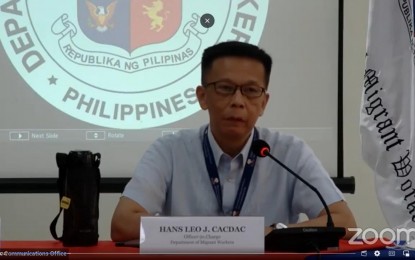
Department of Migrant Workers Officer-in-charge Undersecretary Hans Leo Cacdac (File photo)
MANILA – The Department of Migrant Workers (DMW) has expressed support for the ratification of the International Labor Organization (ILO) Convention 190 on Violence and Harassment, citing its relevance for the protection of overseas Filipino workers (OFWs).
In a statement issued on Wednesday, DMW officer-in-charge Undersecretary Hans Leo Cacdac said OFWs, like those in the household and service sector, are mostly vulnerable to physical and sexual harassment especially abroad where they are working inside the homes of their employees.
“The ILO Convention allows the creation of an international framework for the protection of our OFWs. Certain groups of OFWs may be more vulnerable to violence and harassment, such as domestic workers, seafarers, health workers and women workers,” Cacdac said.
“The Convention is especially relevant for our overseas Filipino workers, who may face various forms of violence and harassment in their workplaces abroad, such as physical, psychological, sexual or economic harm,” he added.
Cacdac said the DMW views the ILO Convention as a landmark instrument that promotes the protection of the dignity and safety of all workers, whatever working status, sector or occupation they are in.
He said it will also help eliminate gender-based violence and harassment.
In a letter dated Oct. 13, President Ferdinand R. Marcos Jr. endorsed the ratification of ILO Convention 190 to the Senate.
The DMW, meanwhile, submitted a position paper to the Senate Foreign Relations Committee chaired by Senator Imee R. Marcos, explaining that the ratification of the Convention will highlight the Philippines’ commitment to promoting safe and decent work for all Filipinos regardless of their country of destination.
The DMW pledged to continue its efforts to empower and protect OFWs through continuous training and knowledge development, and provide remedies and assistance to those who experience violence and harassment in their work settings.
ILO Convention 190 entered into force on June 25, 2021, and has been ratified by six countries -- Argentina, Ecuador, Fiji, Namibia, Somalia and Uruguay.
It defines violence and harassment as “a range of unacceptable behaviors and practices, or threats thereof, whether a single occurrence or repeated, that aim at, result in, or are likely to result in physical, psychological, sexual or economic harm, and includes gender-based violence and harassment.”
The Convention also covers both the formal and informal economy and applies to the workplace, work-related activities or work-related communications. (PNA)
